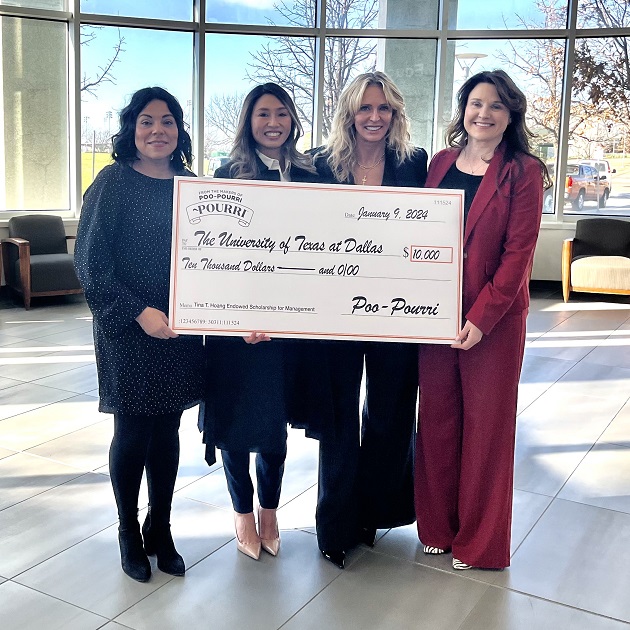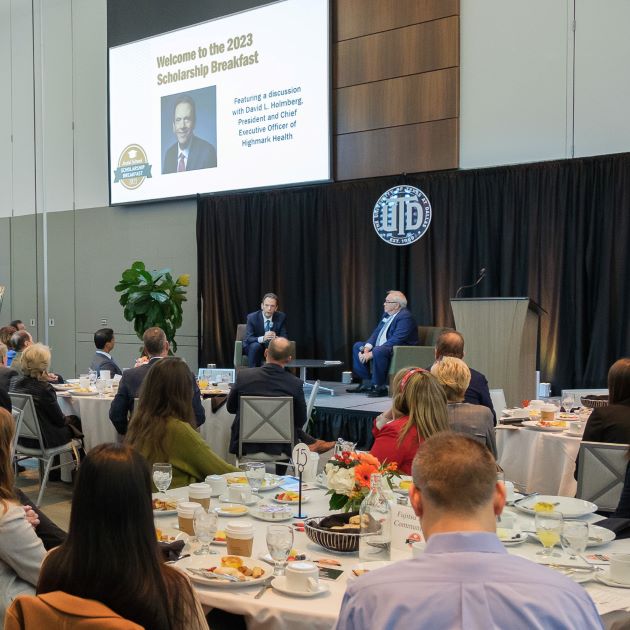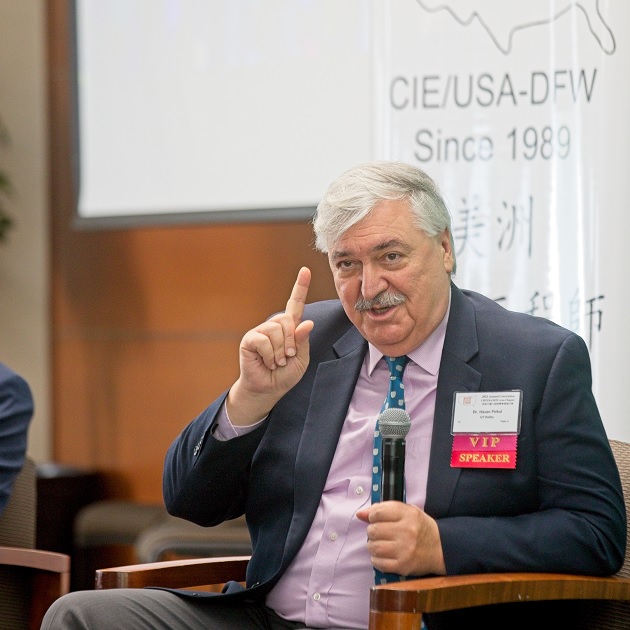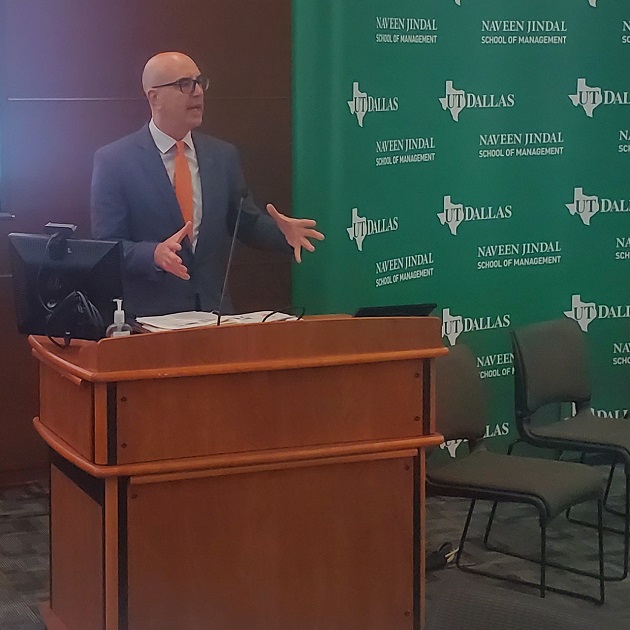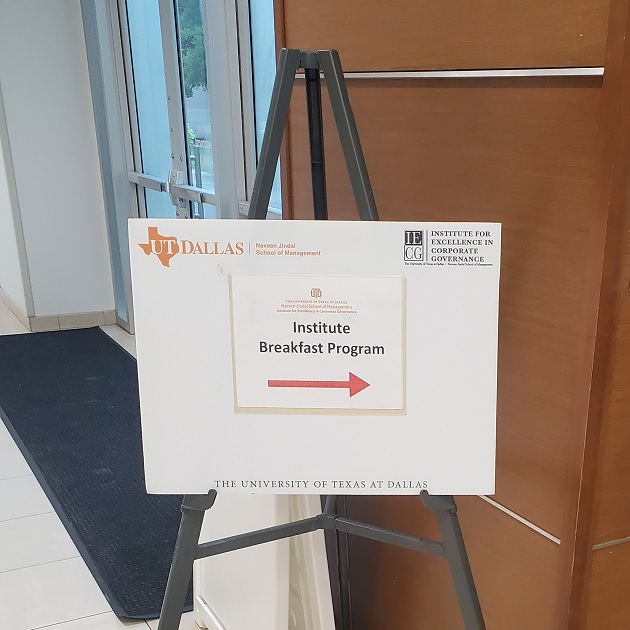People began gathering for events once again this fall on The University of Texas at Dallas campus after a nearly two-year pause necessitated by efforts to curtail the spread of COVID-19.
The Institute for Excellence in Corporate Governance at the Naveen Jindal School of Management presented one of the first formal events, the 19th Annual Corporate Governance Conference. The theme of the Sept. 22 event was “Homecoming,” and presentations centered on pandemic-related and other disruptions common today.
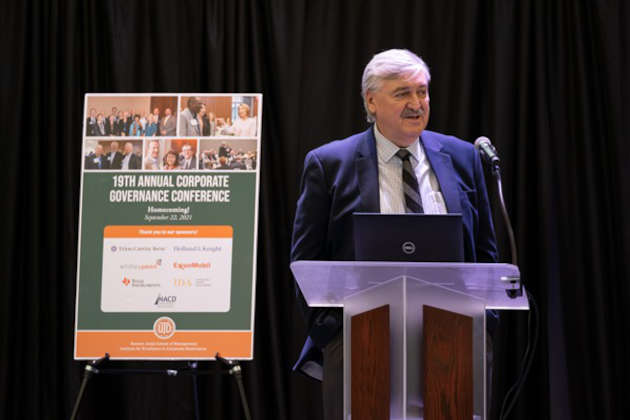
Discussing disturbances and interruptions, Dr. Hasan Pirkul, Caruth Chair and Jindal School dean, said in welcoming remarks, “is of existential importance, not just for corporations, but for our system. If our governance breaks down, nothing works.”
Freeman Company leaders Carrie Freeman Parsons, who is chair, and Bob Priest-Heck, CEO, had a fireside chat, Governance Lessons from the Pandemic, during which they discussed how they kept the trade-show logistics and technology company afloat during the pandemic when virtually all convention centers were padlocked.
Freeman Parsons affirmed that the board and the management team worked in concert when it became obvious to company leadership that they were all going to have to kick into high gear.
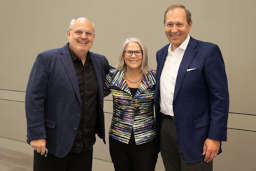
“Everyone was 1000% supportive that we were not going to panic, and we were not going to just react, that we were in this for the long run, that we had a healthy balance sheet, and we were going to make good decisions,” she said. “But we weren’t going to overcorrect because we knew we were going to be coming back, and so we had complete consensus around that and there was a huge amount of trust that had already been built with management — with Bob and his team.”
The Rise of ESG
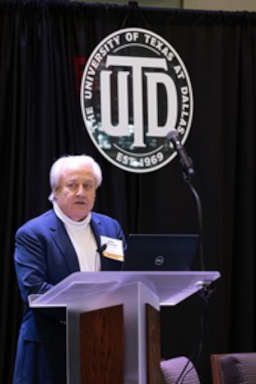
John Ellerman, partner emeritus at Pay Governance LLC, an executive compensation consultancy, spoke about incorporating ESG — environmental, social and governance — metrics into executive incentive plans. Included among these are how well a company delivers in ethics, sustainability, safety, equity, diversity and inclusion.
“Up to this point in time,” he said, “financial metrics have been the primary driver with respect to corporate incentive plans for top executives.”
Ellerman said that ESG measurements are something that investors should look at closely. ESG differentiates itself from shareholder primacy — that is, financial metrics — in that it considers all company stakeholders — customers, local community suppliers and anyone who has a vested interest in the company — as having equal standing.
“Companies that excel at these [metrics] are going to, in fact, be superior companies over the long term — not only just for shareholders, but also for our employees, customers and all those other stakeholders,” Ellerman said.
Simulating a Cybersecurity Incident
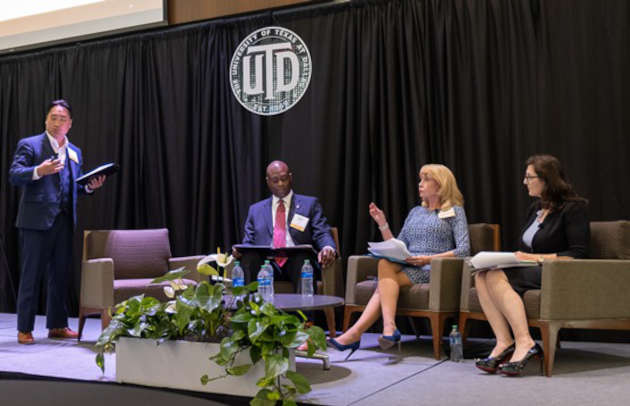
A special panel discussion, Governance and Cybersecurity, walked the audience through a tabletop exercise that simulated a cybersecurity incident at a global corporation and how best to develop an incident response at the C-suite and board levels. It featured:
- FBI Special Agent Miguel Clarke
- general counsel and privacy compliance officer at PCV Murcor, a real estate valuation company, and director of Elevate Services, a law-firm consultancy, Dawn Haghighi
- chief counsel, cyber- and U.S. national security for electric utility Southern California Edison Robert Kang; and
- vice president of global security at dietary supplement company Herbalife Nutrition Jana Monroe.
“One trend that I’ve noticed is that oftentimes the board may not have built-in expertise,” Kang said. That is why boards hire people, he said, including a board adviser in cybersecurity. But the long-term goal, he said, should be to “have some directors who have enough information to actually perform that oversight function.”
‘Disrupt or Be Disrupted’
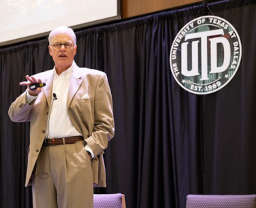
Jackie Kimzey, an associate professor of practice in the Jindal School’s Organizations, Strategy and International Management Area, was the keynote speaker, as part of the Max Hopper Speaker Series. Hopper (1934-2010), an information technology pioneer and past chairman of the JSOM Advisory Council, disrupted the airline industry by developing the computerized airline reservation system SABRE in the mid-1970s.
Kimzey, during his presentation, Board Governance in a Disruptive World, implored leaders to “disrupt or be disrupted.”
“Disruptive innovators are a threat to your organization, whoever you might be,” he said. “In a digital world, your competitive advantage is going to be pretty transitory. Leadership is going to matter, big time.”
Kimzey said that specific education training for directors to enhance the board’s oversight is also important.
“By the time you smell the fire in the boardroom, it’s too late,” he said. “It needs to happen while you’re having success. … You need to … think about what’s going to be around the corner, and it’s about CEOs who are successful at reinventing themselves as fast as the pace of change outside their companies.”
Gregg Ballew, executive director of the institute, opened and closed the conference. He said that the institute had recently updated its strategic plan and would be building on its success over the years.
“We want to connect the dots for management teams, board members and stakeholders to help build better management, board and stakeholder systems,” he said. In addition, he explained that the institute’s initiatives, including the conference, are intended to help build thought leadership among the group’s members and the corporate governance community.
Supporting sponsors of both the institute and the event, which was held at the Davidson-Gundy Alumni Center, included Holland & Knight, Texas Capital Bank, Whitley Penn, ExxonMobil and Texas Instruments. Approximately 80 institute members and guests attended.

